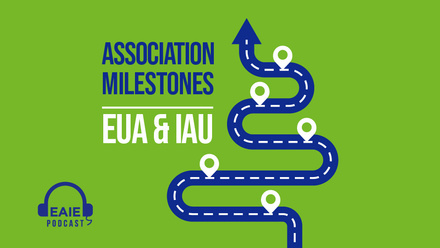Stakeholders in internationalisation: dealing with (dis)engagement

The Winter 2021 issue of Forum shines a spotlight on distributed leadership in international education. Being aware that there is no 'one size fits all' approach to internationalisation in higher education, this latest edition of Forum explores activities that might otherwise remain hidden or go unacknowledged within an institution. In so doing, we have sought to understand whether the distributed nature of international education activity can reinforce and amplify successful internationalisation. We start this exploration by offering up a useful strategy that utilises the three Cs of engagement when dealing with stakeholders.
In pursuit of the broader implementation of internationalisation in our institutions, we need to work with a wide range of stakeholders including academic and administrative staff.
Indeed, analysis in 2018 from EAIE Barometer (second edition) has shown that some of the principal challenges to internationalisation are a lack of institution-wide strategic commitment (in relation to strategy, policies, funding and coordination), insufficient staff engagement, and limited staff expertise on internationalisation.
Recognising that different understandings of internationalisation exist and that motivations for staff to engage in international activities rely on complex intersections of personal, professional, and institutional factors, we think that the three Cs of engagement put forward by Hudzik and McCarthy - Comprehension, Competence, Connection – can help us better understand the presumed disengagement of staff from internationalisation.
In responding to the persistent narrative of staff disengagement, it’s crucial that we address some key questions, including: How true is it that academic staff lack engagement with internationalisation, both in relation to the curriculum and their broader activities? Should the international office be the main or even the only driver of international engagement on our campuses? What role is there for administrative staff outside the international office?
In addressing these questions, it’s important to note that we see the similarities in how academic and administrative staff engage or disengage with internationalisation outweighing the differences. In fact, both groups face similar challenges operating within the same complex organisational context and in an increasingly interconnected and competitive world.
By unpacking the concepts of comprehension, competence, and connection, we put forward a set of strategies to promote staff engagement with internationalisation and to build bridges between staff in their different roles and communities.
Comprehension: ensuring shared understandings
Comprehension, to understand the relevance and impact of internationalisation, may seem like an easy first step, yet research and practice shows that there is much confusion among both administrative and academic staff around the concept of internationalisation.
Many academic staff feel that the concept is vague and ideological and as such difficult to work with. Many studies report a lack of shared understandings. For administrative staff, comprehension generally starts with raising individual awareness of the importance of internationalisation as an institution-wide process. This means helping staff to identify their place within the bigger picture and supporting them to understand where individual staff members can contribute.
If our objective is to bring people on board with the internationalisation process, we need to address what internationalisation means as a concept, both for our institution, for programmes and units, and for individual stakeholders. Furthermore, with so many stakeholders involved, comprehension must lead to shared understandings.
If our objective is to bring people on board with the internationalisation process, we need to address what internationalisation means as a concept
Competence: enabling and empowering action
After reaching sufficiently shared understandings about the relevance and impact of internationalisation, staff need to have access to the right knowledge, skills and mindset to add value to the process of internationalisation within their work, both as individuals and collectively. In many cases, although academic and administrative staff have the right competences, neither group necessarily believes that it has a mandate in relation to internationalisation.
In this sense, administrative staff report a feeling of invisibility in their work and in their contributions. They lack recognition and usually do not feel invited to contribute their competences, perceiving that internationalisation sits outside their daily work and principal responsibilities.
Similarly, academic staff are not sure what specific knowledge and skills they require beyond language and intercultural skills, and also sense that internationalisation is an "add-on" to their work. Academics indicate that they lack the time, support, and recognition to work on internationalisation. They feel insufficiently recognised by senior leadership for their teaching compared to their research, let alone for teaching in an international context. They lack role models or ambassadors to inspire and enable them.
Connection: cultivating relationships and deeper meaning
In addition to shared understandings and adequate competencies, successful internationalisation also requires connection, both with other people as well as with the concept of internationalisation itself. While greater comprehension and competences will help to build the conceptual connection with internationalisation, it can be hard for staff to connect with other people in large organisations (and to cut across the independent silos in an institution). Nevertheless, this purposeful connection with others represents an important step to engage with internationalisation, that is to build the bridge between comprehension, competences and action.
For academic staff, an increased focus on working across disciplines and departments should support greater interpersonal connection around internationalisation. However, academic staff generally lack the right opportunities and platforms to exchange information with others, to reflect on their current activities and to build new practices.
Similarly, administrative staff will feel connected when their contributions are appreciated and recognised, and when they know that they are an important part of the bigger picture - a big picture that they now comprehend and have the competences to contribute to.
Administrative staff will feel connected when their contributions are appreciated and recognised, and when they know that they are an important part of the bigger picture
Strategies to engage staff
Drawing on the three Cs model, we offer a range of strategies to engage staff with internationalisation. Depending on your specific context and priorities, you can see which ones would work for you:
Step 1: Comprehension
- Create time and space for conversations involving staff across disciplines and units
- Discuss the rationales for internationalisation, as well as the values and tensions involved
- Develop sufficiently shared understandings
Step 2: Competences
- Ensure sufficient leadership through role models/ambassadors
- Offer training courses and professional development on internationalisation and intercultural communication
- Review and implement recognition schemes for staff engaged in internationalisation
Step 3: Connection
- Offer a variety of activities and events to communicate and raise awareness on internationalisation
- Connect internationalisation with other concepts, activities and processes (eg diversity, employability, talent development, etc)
- Help staff to make choices and set priorities in relation to internationalisation
On the whole, we believe that we need to start looking differently at staff (dis)engagement with internationalisation. Rather than blaming staff for a presumed lack of engagement, perhaps it is time we asked ourselves if we have done enough to support staff engagement through meaningful communication, building shared understandings and adequate competences, and enabling connections with others and with the concept of internationalisation itself.






